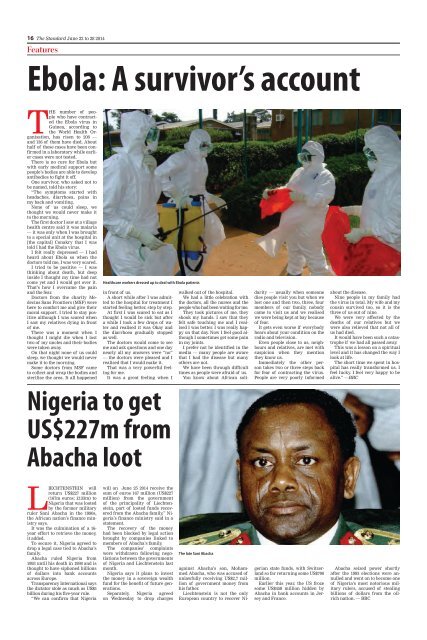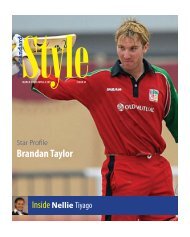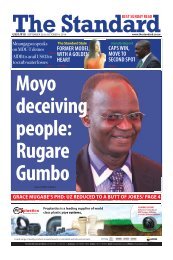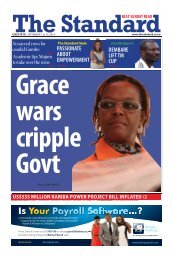The Standard 22 June 2014
Create successful ePaper yourself
Turn your PDF publications into a flip-book with our unique Google optimized e-Paper software.
16 <strong>The</strong> <strong>Standard</strong> <strong>June</strong> <strong>22</strong> to 28 <strong>2014</strong><br />
Features<br />
Ebola: A survivor’s account<br />
<strong>The</strong> number of people<br />
who have contracted<br />
the Ebola virus in<br />
Guinea, according to<br />
the World Health Organisation,<br />
has risen to 208 —<br />
and 136 of them have died. About<br />
half of these cases have been confirmed<br />
in a laboratory while earlier<br />
cases were not tested.<br />
<strong>The</strong>re is no cure for Ebola but<br />
with early medical support some<br />
people’s bodies are able to develop<br />
antibodies to fight it off.<br />
One survivor, who asked not to<br />
be named, told his story:<br />
“<strong>The</strong> symptoms started with<br />
headaches, diarrhoea, pains in<br />
my back and vomiting.<br />
None of us could sleep, we<br />
thought we would never make it<br />
to the morning.<br />
<strong>The</strong> first doctor I saw at a village<br />
health centre said it was malaria<br />
— it was only when I was brought<br />
to a special unit at the hospital in<br />
[the capital] Conakry that I was<br />
told I had the Ebola virus.<br />
I felt really depressed — I had<br />
heard about Ebola so when the<br />
doctors told me, I was very scared.<br />
I tried to be positive — I was<br />
thinking about death, but deep<br />
inside I thought my time had not<br />
come yet and I would get over it.<br />
That’s how I overcame the pain<br />
and the fear.<br />
Doctors from the charity Medecins<br />
Sans Frontiers (MSF) were<br />
here to comfort me and give their<br />
moral support. I tried to stay positive<br />
although I was scared when<br />
I saw my relatives dying in front<br />
of me.<br />
<strong>The</strong>re was a moment when I<br />
thought I might die when I lost<br />
two of my uncles and their bodies<br />
were taken away.<br />
On that night none of us could<br />
sleep, we thought we would never<br />
make it to the morning.<br />
Some doctors from MSF came<br />
to collect and wrap the bodies and<br />
sterilise the area. It all happened<br />
Healthcare workers dressed up to deal with Ebola patients<br />
in front of us.<br />
A short while after I was admitted<br />
to the hospital for treatment I<br />
started feeling better, step by step.<br />
At first I was scared to eat as I<br />
thought I would be sick but after<br />
a while I took a few drops of water<br />
and realised it was Okay and<br />
the diarrhoea gradually stopped<br />
as well.<br />
<strong>The</strong> doctors would come to see<br />
me and ask questions and one day<br />
nearly all my answers were “no”<br />
— the doctors were pleased and I<br />
realised that I would make it.<br />
That was a very powerful feeling<br />
for me.<br />
It was a great feeling when I<br />
walked out of the hospital.<br />
We had a little celebration with<br />
the doctors, all the nurses and the<br />
people who had been waiting for me.<br />
<strong>The</strong>y took pictures of me, they<br />
shook my hands. I saw that they<br />
felt safe touching me and I realised<br />
I was better. I was really happy<br />
on that day. Now I feel good although<br />
I sometimes get some pain<br />
in my joints.<br />
I prefer not be identified in the<br />
media — many people are aware<br />
that I had the disease but many<br />
others are not.<br />
We have been through difficult<br />
times as people were afraid of us.<br />
You know about African solidarity<br />
— usually when someone<br />
dies people visit you but when we<br />
lost one and then two, three, four<br />
members of our family, nobody<br />
came to visit us and we realised<br />
we were being kept at bay because<br />
of fear.<br />
It gets even worse if everybody<br />
hears about your condition on the<br />
radio and television.<br />
Even people close to us, neighbours<br />
and relatives, are met with<br />
suspicion when they mention<br />
they know us.<br />
Immediately the other person<br />
takes two or three steps back<br />
for fear of contracting the virus.<br />
People are very poorly informed<br />
about the disease.<br />
Nine people in my family had<br />
the virus in total. My wife and my<br />
cousin survived too, so it is the<br />
three of us out of nine.<br />
We were very affected by the<br />
deaths of our relatives but we<br />
were also relieved that not all of<br />
us had died.<br />
It would have been such a catastrophe<br />
if we had all passed away.<br />
This was a lesson on a spiritual<br />
level and it has changed the way I<br />
look at life.<br />
<strong>The</strong> short time we spent in hospital<br />
has really transformed us. I<br />
feel lucky. I feel very happy to be<br />
alive.” —BBC<br />
Nigeria to get<br />
US$<strong>22</strong>7m from<br />
Abacha loot<br />
Liechtenstein will<br />
return US$<strong>22</strong>7 million<br />
(167m euros; £133m) to<br />
Nigeria that was looted<br />
by the former military<br />
ruler Sani Abacha in the 1990s,<br />
the African nation’s finance ministry<br />
says.<br />
It was the culmination of a 16-<br />
year effort to retrieve the money,<br />
it added.<br />
To secure it, Nigeria agreed to<br />
drop a legal case tied to Abacha’s<br />
family.<br />
Abacha ruled Nigeria from<br />
1993 until his death in 1998 and is<br />
thought to have siphoned billions<br />
of dollars into bank accounts<br />
across Europe.<br />
Transparency International says<br />
the dictator stole as much as US$5<br />
billion during his five-year rule.<br />
“We can confirm that Nigeria<br />
will on <strong>June</strong> 25 <strong>2014</strong> receive the<br />
sum of euros 167 million (US$<strong>22</strong>7<br />
million) from the government<br />
of the principality of Liechtenstein,<br />
part of looted funds recovered<br />
from the Abacha family,” Nigeria’s<br />
finance ministry said in a<br />
statement.<br />
<strong>The</strong> recovery of the money<br />
had been blocked by legal action<br />
brought by companies linked to<br />
members of Abacha’s family.<br />
<strong>The</strong> companies’ complaints<br />
were withdrawn following negotiations<br />
between the governments<br />
of Nigeria and Liechtenstein last<br />
month.<br />
Nigeria says it plans to invest<br />
the money in a sovereign wealth<br />
fund for the benefit of future generations.<br />
Separately, Nigeria agreed<br />
on Wednesday to drop charges<br />
<strong>The</strong> late Sani Abacha<br />
against Abacha’s son, Mohammed<br />
Abacha, who was accused of<br />
unlawfully receiving US$2,7 million<br />
of government money from<br />
his father.<br />
Liechtenstein is not the only<br />
European country to recover Nigerian<br />
state funds, with Switzerland<br />
so far returning some US$700<br />
million.<br />
Earlier this year, the US froze<br />
some US$458 million hidden by<br />
Abacha in bank accounts in Jersey<br />
and France.<br />
Abacha seized power shortly<br />
after the 1993 elections were annulled<br />
and went on to become one<br />
of Nigeria’s most notorious military<br />
rulers, accused of stealing<br />
billions of dollars from the oilrich<br />
nation. — BBC


















